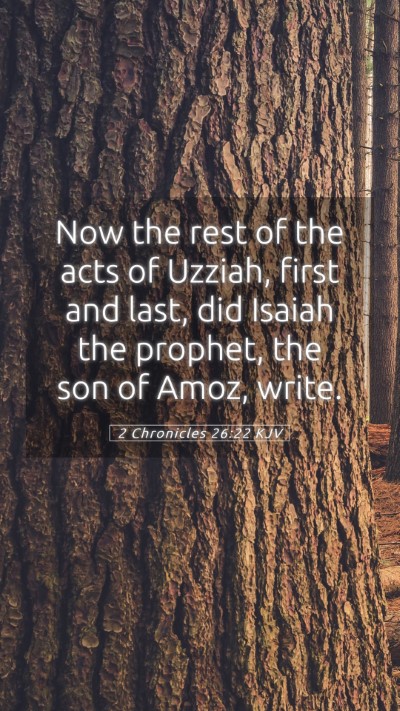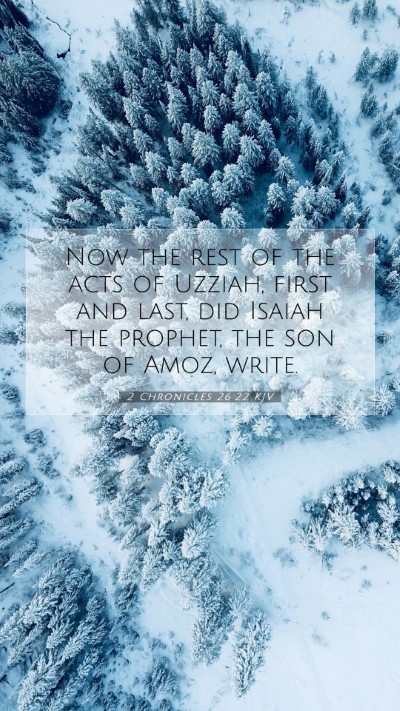Bible Verse Interpretation: 2 Chronicles 26:22
Verse: "Now the rest of the acts of Uzziah, first and last, did Isaiah the prophet, the son of Amoz, write." (2 Chronicles 26:22)
This verse serves as a concluding remark regarding King Uzziah’s reign and emphasizes the role of the prophet Isaiah as a chronicler of Uzziah’s life. Understanding this verse requires us to explore the historical context, the significance of prophetic authorship, and the implications for how we understand Scripture today.
Understanding the Historical Context
Uzziah's Reign: Uzziah (also known as Azariah) was one of the notable kings of Judah, marked by significant military success and economic prosperity. His reign is characterized by infrastructure development and strong alliances, which played a crucial role in the stability of the kingdom.
Isaiah's Role: The mention of the prophet Isaiah is vital. Isaiah was a key figure during Uzziah’s time, and his prophetic writings provide a theological lens through which to interpret the events of Uzziah's reign. Isaiah’s influence on the narrative suggests that his prophetic ministry was integral to understanding the spiritual state of the nation during this period.
Insights from Public Domain Commentaries
Matthew Henry's Commentary
Matthew Henry highlights the fact that the chronicler emphasizes the importance of prophetic writings in documenting the history of Israel's kings. He notes that it is God's work through prophets like Isaiah that offers a reflection of how leaders were viewed in relation to God's covenant and His people. Uzziah's actions, both just and unjust, were critical in illustrating the broader theme of God's sovereignty over Israel's history.
Albert Barnes' Commentary
Albert Barnes focuses on the integral role of the prophets as historical witnesses. He stresses that Isaiah, as a prophet, provided insights into the moral and spiritual conditions of Uzziah's reign. The chronicler’s reference indicates that Uzziah’s merits and failures were not merely political but had significant implications for Israel’s relationship with God. Barnes points out that the prophet's writings are key for future generations to glean lessons from the past.
Adam Clarke's Commentary
Adam Clarke elaborates on the connection between Uzziah's achievements and Isaiah's prophetic revelations. Clarke posits that the chronicler's acknowledgment of Isaiah serves a dual purpose: to affirm God’s providence during Uzziah’s reign and to caution against pride and disobedience, as Uzziah ultimately fell from grace due to his sinful arrogance. Clarke emphasizes that the role of a prophet was not only to proclaim God’s word but also to record history in a way that highlights moral truths.
Theological Implications
Lessons on Leadership: The reference to Isaiah signifies that leaders are accountable not only to their people but to God. Uzziah’s lack of humility and eventual downfall serve as a cautionary tale for contemporary leaders about the dangers of pride and the necessity of spiritual integrity in governance.
The Importance of Prophecies: This verse also illustrates the essential function of prophetic voices in speaking truth to power and documenting the spiritual state of a nation. Isaiah’s writings are a reminder that God continues to engage with His people through chosen messengers, ensuring that both history and divine truth are preserved and understood.
Application for Today
The events surrounding Uzziah reflect timeless truths relevant in our lives today:
- Seeking Humility: Just as Uzziah’s pride led to his downfall, we must cultivate humility in our leadership roles, remembering that true strength comes from reliance on God.
- Valuing Prophetic Voices: In our spiritual journey, recognizing and honoring the prophetic insights of those who guide us can lead to a deeper understanding of God’s will.
- Learning from History: Engaging with Scripture and the historical accounts within it helps us apply biblical lessons to our contemporary situations, informing our decisions and actions.
Cross References
This verse connects with several other passages that illuminate its themes:
- Isaiah 6:1-8 - Isaiah’s vision and calling as a prophet
- 2 Chronicles 26:16 - Uzziah’s pride leading to his sin
- Micah 3:6-7 - The role of prophets and leaders
Conclusion
2 Chronicles 26:22 serves as a poignant reminder of the interplay between leadership, prophecy, and accountability. Through the insights of historical commentators like Matthew Henry, Albert Barnes, and Adam Clarke, we glean valuable lessons about the nature of God’s governance and our role in understanding Scripture and its implications for our lives today.
For those involved in Bible study groups or those seeking Bible study resources, this verse offers rich material for Bible study insights and discussions on how past events influence present faith. Understanding Scripture through Biblical exegesis allows us to explore the depth of these narratives and their applications in our daily living.


